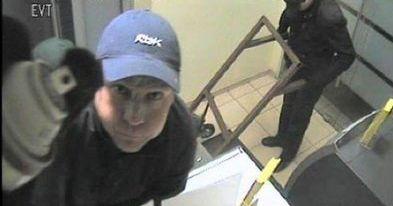
McArthur Wheeler robbed two banks after covering his face with lemon juice in the mistaken belief that, because lemon juice is usable as invisible ink, it would prevent his face from being recorded on surveillance cameras.[3]
The Dunning-Kruger Effect: Stupid People Don't Know They're Stupid
http://paxonbothhouses.
New York Times Interviews David Dunning, Author Of The Dunning-Kruger Effect
http://paxonbothhouses.blogspot.com/2016/01/new-york-times-interviews-david-dunning.html
Stupidity For Dummies
The Study Of Stupidity Helps Understand How Intelligence Works
http://paxonbothhouses.blogspot.com/2016/01/stupidity-for-dummies-study-of.html
Mark Twain, Adolf Hitler And The Dunning-Kruger Effect
http://paxonbothhouses.
"The Death Of Epistemolgy"
"Are Republicans Insane?" Best Pax Posts
Years
after McArthur Wheeler was sentenced, David Dunning, a Cornell
professor of social psychology, read of this case and had an Epiphany:
If Wheeler was too stupid to be a bank robber, perhaps he was also too
stupid to know that he was too stupid to be a bank robber - that is, his
stupidity protected him from an awareness of his own stupidity.
Professor
Dunning and his graduate student assistant, Justin Kruger implemented a
research project which produced some novel findings in a 1999 paper,
Unskilled and Unaware of It: How Difficulties of Recognizing One’s Own
Incompetence Lead to Inflated Self-assessments.
Dunning and Kruger argued in their paper that,
When people are incompetent in the strategies they adopt to achieve
success and satisfaction, they suffer a dual burden: Not only do they
reach erroneous conclusions and make unfortunate choices, but their
incompetence robs them of the ability to realize it. Instead, like Mr.
Wheeler, they are left with the erroneous impression they are doing just
fine.
This
became known as the Dunning-Kruger Effect which explains how our
incompetence can be so extreme that it masks our ability to recognize
our incompetence. Professor Dunning explains that because his research
speciality is in decision-making, he was always asking questions about,
How well do people make the decisions they have to make in life? And I
became very interested in judgments about the self, simply because,
well, people tend to say things, whether it be in everyday life or in
the lab, that just couldn’t possibly be true. And I became fascinated
with that. Not just that people said these positive things about
themselves, but they really, really believed them. Which led to my
observation: if you’re really incompetent, you can’t know you’re
incompetent.
"Against logic, there is no armor like ignorance.”
Laurence J. Peter

New York Times Interviews David Dunning, Author Of The Dunning-Kruger Effect
http://paxonbothhouses.blogspot.com/2016/01/new-york-times-interviews-david-dunning.html
Stupidity For Dummies
The Study Of Stupidity Helps Understand How Intelligence Works
http://paxonbothhouses.blogspot.com/2016/01/stupidity-for-dummies-study-of.html
Mark Twain, Adolf Hitler And The Dunning-Kruger Effect
http://paxonbothhouses.
"The Death Of Epistemolgy"
"Are Republicans Insane?" Best Pax Posts
If Wheeler was too stupid to be a bank robber, perhaps he was also too stupid to know that he was too stupid to be a bank robber - that is, his stupidity protected him from an awareness of his own stupidity.Professor Dunning and his graduate student assistant, Justin Kruger implemented a research project which produced some novel findings in a 1999 paper, Unskilled and Unaware of It: How Difficulties of Recognizing One’s Own Incompetence Lead to Inflated Self-assessments.
When people are incompetent in the strategies they adopt to achieve success and satisfaction, they suffer a dual burden: Not only do they reach erroneous conclusions and make unfortunate choices, but their incompetence robs them of the ability to realize it. Instead, like Mr. Wheeler, they are left with the erroneous impression they are doing just fine.This became known as the Dunning-Kruger Effect which explains how our incompetence can be so extreme that it masks our ability to recognize our incompetence. Professor Dunning explains that because his research speciality is in decision-making, he was always asking questions about,
How well do people make the decisions they have to make in life? And I became very interested in judgments about the self, simply because, well, people tend to say things, whether it be in everyday life or in the lab, that just couldn’t possibly be true. And I became fascinated with that. Not just that people said these positive things about themselves, but they really, really believed them. Which led to my observation: if you’re really incompetent, you can’t know you’re incompetent.
"Against logic, there is no armor like ignorance.”
Laurence J. Peter


No comments:
Post a Comment